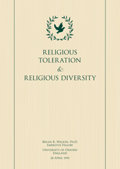Strictly speaking, movements to be counted as sects are those which constitute “separated believers”, that is to say, bodies which, because of differences of doctrine, practice, or organization, are in schism from the mainstream church(es), the broad tradition of which, however, they in large part share. It is this element of sharing, and the diminution over time of the significance of their differences, which permitted some erstwhile sects to graduate to the position of being regarded as denominations. Denominations generally share close parity of esteem one with another. They come to be recognized as such as the issues on which there is tension with the wider society—such tension being the typical circumstance of movements designated as sects—come to be resolved or dissipated. Thus, the Baptists, the Disciples of Christ, the Church of the Nazarene, and in some respects, even the Methodists, all exemplify bodies that have traversed the sect-to-denomination process. The gradual acknowledgement of denominational status of particular movements also indicates the growth of toleration in the wider society as, little-by-little, the legal restrictions (in Europe) on these movements and the social opprobrium which they suffered were eventually mitigated.
Not all sects evolve into denominations, however, and much depends on their circumstances of origin and the type of orientation towards the world which characterizes their teaching. Sects which, like Jehovah’s Witnesses and the Christadelphians, make the early second advent the primary focus of their beliefs, are likely to remain in sectarian tension with the wider society, particularly if they pursue a vigorous evangelistic programme. So, too, are sects such as the Exclusive (i.e. Plymouth) Brethren, who (although also endorsing belief in the early return of Christ) make their central concern withdrawal from the wider society, which is regarded as inherently evil, into their own exclusive community. The tension existing between sects like these and the authorities and, at times, between the sects and the general public has tended to be concentrated not on any issue of the criminal law, but on the sectarians’ refusal to participate in the civic responsibilities commonly required of citizens. Thus, they have typically made conscientious objection to military service, or, in the case of some sects, sought exemption from jury service, or from membership of trade unions in countries (Britain and Sweden) where such membership was, in certain industries, actually or virtually obligatory. Over time, in country after country, such rights of conscience have gradually been conceded, as was the right of Jehovah’s Witnesses in the United States to exemption from saluting the national flag or from participating in singing the national anthem in school assemblies or on other public occasions. Christian sects, in these and other instances, have fought and often won their cases in national or, at times, international courts of justice: in doing so they have enlarged the area of religious freedom. But, as with those sects which eventually graduated into denominations, they were, especially in their earliest days as new movements, often subject to persecution, discrimination and harassment.





























